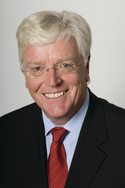A happy ending
13 September 2011Dr Wilfried Haensel, executive director of PlasticsEurope, talks to Joanne Hunter about the demands and challenges for his industry
True of many industries, the focus of the plastics sector is squarely on finding end of life solutions and moving towards an ambitious target of a “zero plastics waste society”, confirms Dr Haensel, a leading voice in European plastics, from packaging to durables.
First of all he presented the scale of the problem. “Landfill is not an adequate solution for plastics waste. In fact, landfilling plastics waste simply means throwing oil away,” he says. “At the moment there is no uniform plastics waste management practice in the EU-27 countries; some countries are far ahead, while others are way behind. At current rates, plastics being landfilled in Europe will represent the equivalent of needlessly burying around €80 billion in crude oil between now and 2020.”
Work on solutions is engaging the supply chain. “There is an increasing co-operation between the producers and the converters to enable a mix of recyclates and virgin resin in the manufacture of products and to put on the market applications/products easy to sort and to recycle.
“Also, the role of the industry is to communicate a vision of waste management that is in line with the EU waste hierarchy policy, to spread the industry's know-how and share information on our best practices regarding waste management. To work in partnership with recyclers, authorities, in order to organise waste collections and commit to accept/buy recycled materials on a permanent basis coming from these collection/recycling schemes, and finally to makethe general public aware that a proper plastics waste management scheme leads to greater resource efficiency and consequently would help us achieve the objective “zero landfill by 2020 in all European countries”.
Substrate developers and converters are part of the process of giving birth to alternatives that offer better environmental and business outcomes, he believes.
“Our industry has always been in favour of innovation and the corresponding progress. Innovation, and consequently a move to better alternatives, is part of any sustainable business process. In printing, the move from solvent-based inks to water-based inks is certainly a good move.” He also welcomes new improved polymers that give opportunities to reduce the weight of packaging for “doing more with less”.
Proactive
PlasticsEurope is behind a proactive industry sector that is reducing energy use and CO2 emissions and supporting efforts to collect plastics waste and organise recycling and energy recovery through Green Dot systems.
“We believe that for our industry to be successful it must pro-actively engage with all key actors of society, to listen to their needs, their concerns and to respond accordingly. The key here is to reach out,” he stresses.
“To such an end, we recently launched a global initiative that gathers 54 plastics associations from around the globe to sign up to a declaration to deploy an action plan to solve the issue of marine litter.
“Another example is PolyTalk, a three-day summit we launched last year in our effort to provide a platform for open and transparent discussions between the industry, the policy-makers, NGOs and other interest groups on major societal challenges and the contributions of all actors to shape a solution.”
How has Dr Haensel’s career path equipped him for a role with such a huge scope? “I joined PlasticsEurope in January 2007 and before then I worked for BASF for more than 20 years in various functions around the world, mainly in plastics. As senior vice president, I have been responsible for one of the major plastics businesses. These responsibilities allowed me to get a major insight into all facets of the plastics business.”
Dr Haensel’s vision for plastics in society goes like this. “The magic and versatility of plastics are such that they have become intrinsic to any progress, improvement, invention or technological breakthrough that comes about in every area you can think about.”
Plastics offer solutions to societal challenges. “Take the growing population aspect together with desertification of land: this is a serious global issue. Plastics innovation is already contributing in developing new agricultural technologies, intelligent packaging, lighter materials to secure tripling of crops’ yield, longer food preservation and less volume for transport.”
To achieve this and more, he says: “We need to create a favourable working environment by changing the social perception of plastics as a cheap dispensable material that is taken for granted to a true understanding of the genuine nature of plastics. Plastics is an awesome chemical and engineering achievement that reflects the nature of mankind itself: inventiveness, resilience and genial ingenuity.” In a nutshell, he concludes: “Plastics is smart stuff!”
Dr Wilfried Haensel Dr Wilfried Haensel External weblinksConverting Today is not responsible for the content of external internet sites.PlasticsEurope


